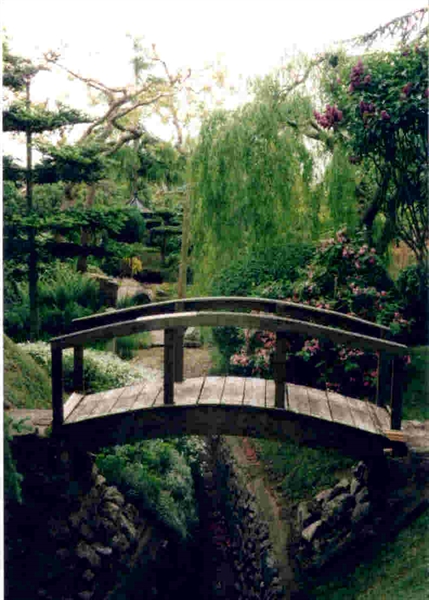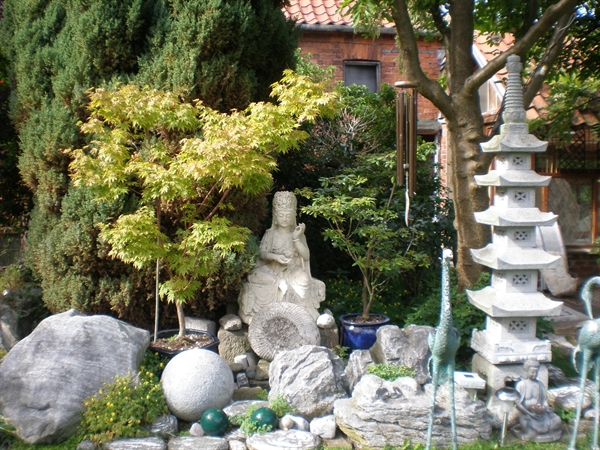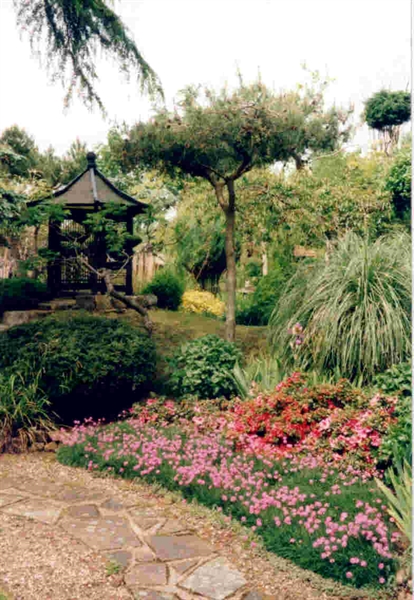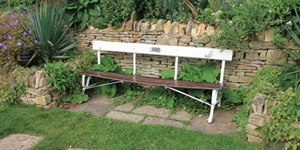Garden Meditation Day 2024 is on Friday, May 3, 2024: Differences in meditation practices?
Friday, May 3, 2024 is Garden Meditation Day 2024. The Mindfulness Center accupuncture, yoga, meditation, tai chi, qigong, massage, hypnosis
As an Amazon Associate I earn from qualifying purchases.

"Basic Meditation Techniques: This involves sitting in a comfortable position and just trying to quiet your mind by thinking of nothing. It’s not always easy to do this if you don’t have practice with it. But a good way to begin is to think of yourself as an ‘observer of your thoughts,’ just noticing what the narrative voice in your head says, but not engaging it. As thoughts materialize in your mind, just let them go. That’s the basic idea. (Here's more on basic meditation.)
Focused Meditation Techniques: With this technique, you focus on something intently, but don’t engage your thoughts about it. You can focus on something visual, like a statue; something auditory, like a metronome or tape of ocean waves; something constant, like your own breathing; or a simple concept, like ‘unconditional compassion’. Some people find it easier to do this than to focus on nothing, but the idea is the same -- staying in the present moment and circumventing the constant stream of commentary from your conscious mind, and allowing yourself to slip into an altered state of consciousness.
Activity-Oriented Meditation Techniques: With this type of meditation, you engage in a repetitive activity, or one where you can get ‘in the zone’ and experience ‘flow.’ Again, this quiets the mind, and allows your brain to shift. Activities like gardening, creating artwork, or practicing yoga can all be effective forms of meditation. (See this article on walking meditation for specific instructions.)
Mindfulness Techniques: Mindfulness can be a form of meditation that, like activity-oriented meditation, doesn’t really look like meditation. It simply involved staying in the present moment rather than thinking about the future or the past. (Again, this is more difficult than it seems!) Focusing on sensations you feel in your body is one way to stay ‘in the now;’ focusing on emotions and where you feel them in your body (not examining why you feel them, but just experiencing them as sensations) is another. (Read this article for more on mindfulness.)
Spiritual Meditating: Meditation can also be a spiritual practice. (It does not have to be, and certainly isn't specific to any one religion, but can be used as a spiritual experience.) Many people experience meditation as a form of prayer -- the form where God 'speaks,' rather than just listening. That’s right, many people experience ‘guidance’ or inner wisdom once the mind is quiet, and meditate for this purpose. You can meditate on a singular question until an answer comes (though some would say this is engaging your thinking mind too much), or meditate to clear their mind and accept whatever comes that day.
"
"
What is the Transcendental Meditation (TM)
technique? It is a simple, natural, effortless
procedure practiced 20 minutes twice each day
while sitting comfortably with the eyes closed. It’s
not a religion, philosophy, or lifestyle. It’s the most
widely practiced, most researched, and most
effective method of self-development.
What happens when you meditate?
The Transcendental Meditation technique allows your
mind to settle inward beyond thought to experience
the source of thought — pure awareness, also
known as transcendental consciousness. This is the
most silent and peaceful level of consciousness —
your innermost Self. In this state of restful
alertness, your brain functions with significantly
greater coherence and your body gains deep rest.
"

Kindly suggest the advantages of meditation and which is the way to meditate.?
Put a comfy chair by the window. Have a table or stand nearby. Choose favorite objects or pictures of places you love and put them on your table. Try to have a plant, fishbowl (something alive), candle and books available too. Most importantly, these things should be items important to you.
I like having something to hold during my meditations. I use stones or serenity beads. I light a candle- usually read a paragraph or two from a current favorite book on spirituality and I'm ready for my meditation.
My altar is on a dresser that I pass a hundred time s a day. There I keep a silk heart shaped pin cushion, some porcelain hand vases (I collect hands -- they are very spiritual to me), a candle and an orchid plant. I pause at my altar each morning and again during the day.
I touch the objects and truly feel I'm connecting with my soul as I acknowledge these meaningful objects that I love. I also have altar outside. I love to be there especially when it is warm and sunny. My outdoor altar is really odd, but I love it! It's a small shell shaped bird feeder on a stake in the middle of a small garden. I try to keep it filled with bird seed for the birds; that’s part of the ritual. Empty or full though, I pause there too. Again, connecting with my spirit and soul.
As you can see, creating these sanctuaries and altars can be simple- in fact they should be simple. As I find myself attracted, by divine intervention. to new things, I add them to my spaces. I suddenly have all new collections with special meaning to me.
So, whether you are well on your way on your spiritual path or only beginning, it is a good idea to create a private space for yourself where you can derive an immediate sense of peace.
When you enter this room or approach the altar you've prepared your whole body and soul will respond to it and be more ready for the meditation time you give yourself.
If, during your busy day, you need to reconnect with your inner peace just a walk by or a glance at your sanctuary will give you the connection needed until you have more time for yourself.
I highly recommend creating this private sanctuary as soon as you can. It will change and evolve as you do. Be ready to surprise yourself and have fun while you're at it. Give yourself this gift of space and objects!
u may also surf the following link for further details.

Zen Garden Help!!!!!!!!!?
I live in Ohio but I found this website that may help you in purchasing your plants:
Here's an article that might be helpful too:
Since you're in Salem, MA, you'll be limited w/some of the tropicals for outdoors - unless you pot them & take them in & out for the winter. But that can be too much trouble. So eliminate flowers such as Orchids, some Hibiscus plants, some fruit trees like Oranges for example. You'd have to check each type of plant for it's zone & hardiness.
A zen garden isn't a garden in the traditional way of thinking. For example, a typical U.S. garden. It generally doesn't contain plants. If it does, the plants need to be meaningful to the individual and they need to be minimal - not too many. It should have a feeling of openness about it.
"Focus on greenery. A large swath of green foliage provides continuity in the garden and is pleasing to the eye. Riotous red and orange blossoms are cheerful but too stimulating for a meditation garden."
You want it to be tranquil and soothing to the senses - creating a calming effect of course.
Try to use low maintenance plantings like ornamental grasses - they're hardy too. Use fragrance to calm the senses, not overwhelm them. For example, Gardenias and Jasmine are known for their powerful perfume. If you choose flowers that are extremely aromatic, use only one variety to avoid clashing scents.
I would use bamboo because of its beauty & traditional characteristics (but some can grow almost 4ft.per day!) I have many Rose bushes & they tend to be hardy & low maintenance. My Asiatic Lilies are beautiful - but remember - they tend to spread quickly.
Good Luck w/your zen garden - I'm sure it'll be gorgeous!
























